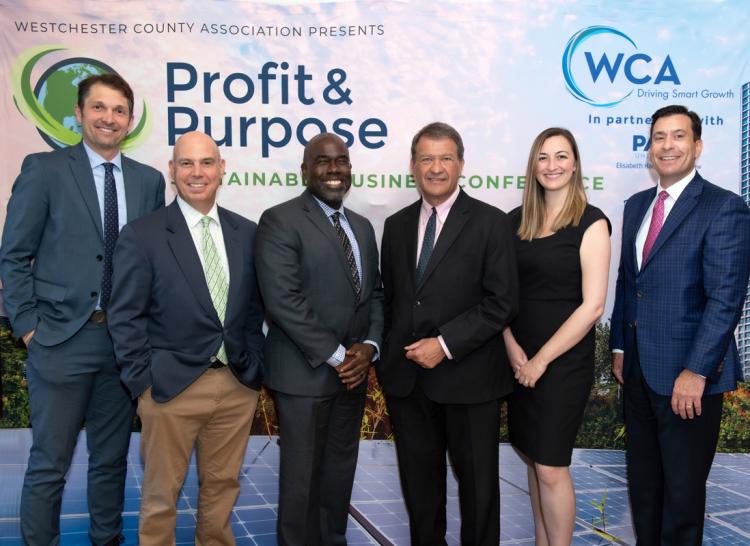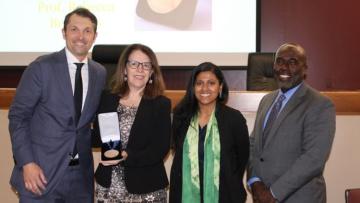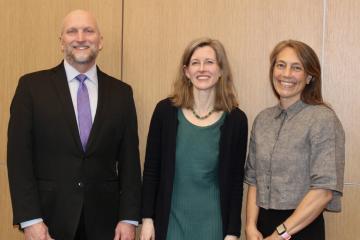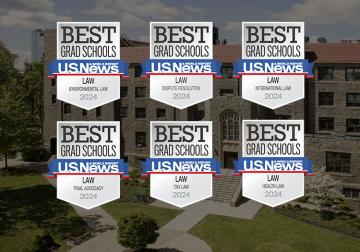Westchester County Association and Pace University’s Elisabeth Haub School of Law Convene Second Annual ‘Profit & Purpose’ Sustainable Business Conference to Prepare Business Leaders for a Low-Carbon Future

Top Experts in Energy Policy, Business Strategy, Finance, Law and Compliance Show Businesses How Sustainability Management Drives Economic Growth
White Plains, New York -- (June 5, 2023) Close to 200 business, nonprofit, and government leaders attended the WCA’s 2nd Annual Sustainable Business Conference hosted in partnership with Pace University’s Elisabeth Haub School of Law. The event, held June 1 at the law school, focused on new opportunities in sustainable investing and real estate, navigating an evolving regulatory landscape, and the connection between sustainability and diversity, equity and inclusion. New this year, a “Sustainability Bootcamp” workshop served as a primer for businesses of all sizes to get started with practical tools to develop a sustainability program.
“We’re at the threshold of a fundamental transformation of businesses toward a more sustainable future. Sustainability is not a far-away concept—it’s here and now,” said Michael N. Romita, president and CEO of the Westchester County Association (WCA). “This conference brought together business leaders at every level to urge the adoption of a sustainability mindset and to ensure they are prepared for the transition to a low-carbon future. The WCA is positioning Westchester County to become a center for sustainable business innovation.”
“We’re proud to collaborate with the WCA to present this important conference,” said Horace E. Anderson, Jr., dean, Elisabeth Haub School of Law at Pace University. “This partnership allows us to leverage our combined knowledge, networks, and expertise in addressing the urgent sustainability challenges of our business community with creative solutions. Sustainability is core to our mission as evinced by the successful launch of our Sustainable Business Law Hub.”
Key Takeaways
- ESG is here now and it’s here to stay.
Government regulations, market pressures, generational shifts, and the need to operate within a sustainable society are driving businesses to embrace environmental, social, and governance (ESG) factors. “Businesses need to think about ESG risks and opportunities as business risks and opportunities,” said Christina E. Gunnell, keynote speaker and Senior Manager, Sustainability & ESG Services, Deloitte & Touche LLP. She emphasized new regulations coming down the pike that will impact all businesses—not just major corporations, but those further down the supply chain. “Smaller companies are going to need to measure their emissions and set goals and targets. Getting ahead of those regulations is the biggest trend for most companies.”
“All investing is sustainable investing,” said Anna Snider, Managing Director and Head of Due Diligence for the CIO, Bank of America. “The decisions that are being made by companies related to how they think about risk—human capital risk or environmental risk. That's real. For example, a company may have rising insurance costs because they are in an area that's being affected by ‘hundred-year floods’ every two years. If you look at these real-world examples, you realize all companies are impacted by ESG-related factors.”
- Sustainability should not be siloed.
Sustainability is no longer a siloed initiative; it has become part of the core strategy for most businesses. There’s a role for organizations of all sizes and employees at every level. That starts with getting C-suite buy in and involves employees, customers, and other stakeholders to develop initiatives that are most impactful for your business, the environment, and the community, said Gillian Griffin, Sustainable Supply Chain Program Manager, Senior P2 Engineer, New York State Pollution Prevention Institute at Rochester Institute of Technology.
“Sustainability objectives and targets need to be integrated into overall business goals. It is not something that is siloed; sustainability targets need to be achievable, measurable, and ultimately, integrated into every aspect of your business,” said Griffin.
There’s also new collaboration on sustainability spanning public and private entities, said Myrrh Caplan, National Vice President, Sustainability, Skanska. “There’s a lot of involvement in the conversation around resilience. There’s collaboration happening among big firms. What we have seen is that we can't make as much of an impact on something as big as decarbonization of the industry unless we're actually working together. We’re now in a coalition to create an industry playbook for decarbonization. Our intention here is to really speed to market the standards that are going to more quickly provide a better built environment.”
- Adopting sustainable practices creates competitive advantage.
Prioritizing sustainability includes diversity, equity, and inclusion and improves the bottom line. “Diverse teams have been shown to perform better,” said Jacqueline Hattar, Partner at Wilson Elser LLP. “Having an inclusive culture is a business imperative—our clients demand it and it helps us serve them better. It helps sustain us in the long term, particularly in talent attraction.”
“Our ESG strategy is 100% part of our strategic growth proposition,” said Tanya Sutherland, Vice President, Senior Managing Counsel for Strategic Growth, Mastercard. “People may see it as a ‘nice to have.’ But we understand it’s integral to our core business, that our stakeholders are not just our shareholders or investors, but our employees, governments, customers, and supply chain.”
Conference speakers include a who’s who of corporate and political leaders, noted Romita. “The caliber of discourse at this conference is very high-level. There is so much static with this concept that it’s important to convene real authorities working on practical solutions. The WCA connects with experts for and amongst our members.”
The conference was made possible with major support from sponsors Bank of America, Brightcore, Chase, Con Edison, Dandelion Geothermal, Harrison Edwards, Pace University’s Elisabeth Haub School of Law, PKF O’Connor Davies, Skanska, Webster Bank, and The Catalyst/Westchester County Economic Development.
VIEW PHOTOS FROM THE 2023 PROFIT & PURPOSE SUSTAINABLE BUSINESS CONFERENCE
Speakers & Sessions
Keynote Speaker Christina Gunnell, Senior Manager, Sustainablility & ESG, Deloitte
Sustainability Boot Camp
Gillian Griffin, Sustainable Supply Chain Program Manager, Senior P2 Engineer and Kim Bawden, Green Technology Accelerator Center Program Manager, Senior Staff Engineer from the New York State Pollution Prevention Institute at RIT
Sustainable Investing and Evaluating ESG Factors
Michael Romita, President/CEO, WCA; Anna Snider, Managing Director and Head of Due Diligence for the CIO, Bank of America; Juan Lois, Executive Director; JP Morgan Chase; John Olerio, Senior Managing Director, Head of Webster Investments; Webster Bank
Sustainability and the Built Environment
Kristen Motel, Partner, Cuddy + Feder; Cameron Best. Director, Business Development, Brightcore; Julia Gisewite, Chief Sustainability Officer, Turner Construction; Laziza Rakhimova, Energy Efficiency Business Development Manager, Con Edison; Myrrh Caplan, National VP for Sustainability; Skanska
Mandatory Climate Risk and ESG
Harriette I. Resnick, Acting Executive Deputy Superintendent, Climate Division; New York State Department of Financial Services; Michael L. Arnold, Partner, Corporate; Cravath, Swaine & Moore LLP, Jason J. Czarnezki, Sustainable Business Law Hub at Elisabeth Haub School of Law at Pace University; Marc L. Rinaldi, Partner; PKF O'Connor Davies LLP; Tanya Southerland, Vice President, Senior Managing Counsel for Strategic Growth; Mastercard
The DEI of ESG
Jacqueline Hattar, Partner, Wilson Elser; Natasha I Fapohunda, Senior Vice President & Assistant General Counsel, Strategic Growth; Mastercard; Joan Chaya, Senior Director of Diversity, Equity & Inclusion; Montefiore Einstein; Bridget Gibbons, Westchester County.
About the Westchester County Association
The Westchester County Association is the most influential organization of businesses and non-profits in Westchester and the surrounding region. We unite and mobilize professional leaders to advance issues and lead initiatives that strengthen our regional economy. Our key objectives are to drive Westchester’s economic vitality, stimulate new business development and job creation, and provide our members with the resources and talent they need to grow. For more information about the Westchester County Association, visit www.westchester.org.
About Elisabeth Haub School of Law at Pace University
Pace University’s Elisabeth Haub School of Law offers JD and Masters of Law degrees in both Environmental and International Law, as well as a Doctor of Juridical Science (SJD) in Environmental Law. The school, housed on the University’s campus in White Plains, NY, opened its doors in 1976 and has over 9,000 alumni around the world. The school maintains a unique philosophy and approach to legal education that strikes an important balance between practice and theory. Haub Law launched its Environmental Law Program in 1978, and it has long been ranked among the world’s leading university programs, with a current #1 ranking by U.S. News & World Report.



